(b) (i) Advise Andrew of the income tax (IT) and capital gains tax (CGT) reliefs available on his investment inthe ordinary share capital of Scalar Limited, together with any conditions which need to be satisfied.Your answer should clearly identify any st
题目
(b) (i) Advise Andrew of the income tax (IT) and capital gains tax (CGT) reliefs available on his investment in
the ordinary share capital of Scalar Limited, together with any conditions which need to be satisfied.
Your answer should clearly identify any steps that should be taken by Andrew and the other investors
to obtain the maximum relief. (13 marks)
相似考题
更多“(b) (i) Advise Andrew of the income tax (IT) and capital gains tax (CGT) reliefs available on his investment inthe ordinary share capital of Scalar Limited, together with any conditions which need to be satisfied.Your answer should clearly identify any st”相关问题
-
第1题:
(ii) State, giving reasons, the tax reliefs in relation to inheritance tax (IHT) and capital gains tax (CGT) which
would be available to Alasdair if he acquires the warehouse and leases it to Gallus & Co, rather than to
an unconnected tenant. (4 marks)
正确答案:
(ii) Apart from the fact that Alasdair can keep an eye on his tenant, the main advantages are twofold:
IHT: If the firm are the tenants, the property will be land and buildings used in a business carried on by a partnership
in which the donor is a partner. Thus, Alasdair will be able to claim business property relief (BPR) at a rate of 50%
so long as he remains a partner in the firm. However, this relief would not be available until Alasdair has owned
the property for at least two years from his firm taking up the tenancy.
CGT: As Alasdair is a partner in the firm using the building, it will also be a qualifying asset for the purposes of rollover
relief on any gains arising from the disposal of the property. Assuming that Alasdair acquires a replacement asset
which will be used in the trade, the gain on sale can be deferred against the tax base cost of the replacement asset.
In the event that rollover relief cannot be used, any gains on disposal will be subject to business asset taper relief. -
第2题:
(b) Assuming that the income from the sale of the books is not treated as trading income, calculate Bob’s taxable
income and gains for all relevant tax years, using any loss reliefs in the most tax-efficient manner. Your
answer should include an explanation of the loss reliefs available and your reasons for using (or not using)
them. (12 marks)
Assume that the rates and allowances for 2004/05 apply throughout this part of the question.
正确答案:
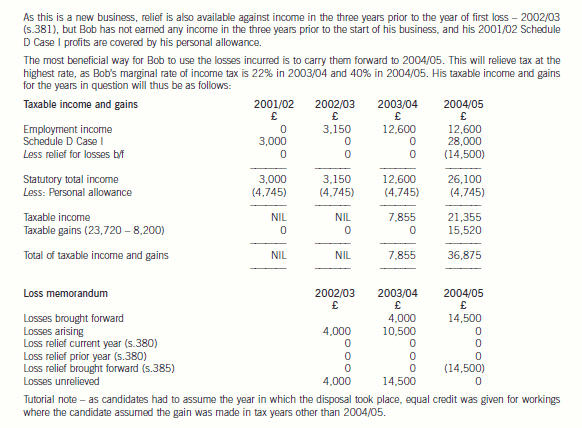
-
第3题:
(ii) Explain the income tax (IT), national insurance (NIC) and capital gains tax (CGT) implications arising on
the grant to and exercise by an employee of an option to buy shares in an unapproved share option
scheme and on the subsequent sale of these shares. State clearly how these would apply in Henry’s
case. (8 marks)
正确答案:
(ii) Exercising of share options
The share option is not part of an approved scheme, and will not therefore enjoy the benefits of such a scheme. There
are three events with tax consequences – grant, exercise and sale.
Grant. If shares or options over shares are sold or granted at less than market value, an income tax charge can arise on
the difference between the price paid and the market value. [Weight v Salmon]. In addition, if options can be exercised
more than 10 years after the date of the grant, an employment income charge can arise. This is based on the market
value at the date of grant less the grant and exercise priced.
In Henry’s case, the options were issued with an exercise price equal to the then market value, and cannot be exercised
more than 10 years from the grant. No income tax charge therefore arises on grant.
Exercise. On exercise, the individual pays the agreed amount in return for a number of shares in the company. The price
paid is compared with the open market value at that time, and if less, the difference is charged to income tax. National
insurance also applies, and the company has to pay Class 1 NIC. If the company and shareholder agree, the national
insurance can be passed onto the individual, and the liability becomes a deductible expense in calculating the income
tax charge.
In Henry’s case on exercise, the difference between market value (£14) and the price paid (£1) per share will be taxed
as income. Therefore, £130,000 (10,000 x (£14 – £1)) will be taxed as income. In addition, national insurance will
be chargeable on the company at 12·8% (£16,640) and on Henry at the rate of 1% (£1,300).
Sale. The base cost of the shares is taken to be the market value at the time of exercise. On the sale of the shares, any
gain or loss arising falls under the capital gains tax rules, and CGT will be payable on any gain. Business asset taper
relief will be available as the company is an unquoted trading company, but the relief will only run from the time that
the share options are exercised – i.e. from the time when the shares were acquired.
In Henry’s case, the sale of the shares will immediately follow the exercise of the option (6 days later). The sale proceeds
and the market value at the time of exercise are likely to be similar; thus little to no gain is likely to arise. -
第4题:
(ii) Compute the annual income tax saving from your recommendation in (i) above as compared with the
situation where Cindy retains both the property and the shares. Identify any other tax implications
arising from your recommendation. Your answer should consider all relevant taxes. (3 marks)
正确答案: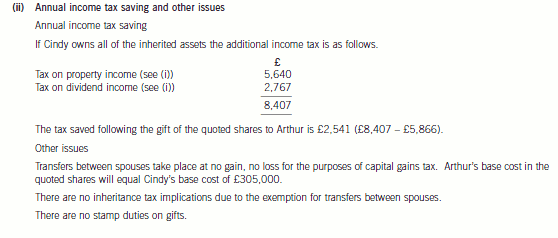
-
第5题:
(c) (i) Compute Gloria’s capital gains tax liability for 2006/07 ignoring any claims or elections available to
reduce the liability. (3 marks)
正确答案:
-
第6题:
(c) Prepare brief notes for the proposed meeting with Charles and Jane. Clearly identify the further information
you would need in order to advise them more fully and suggest appropriate personal financial planning
protection products, in respect of both death and serious illness. (9 marks)
You should assume that the income tax rates and allowances for the tax year 2005/06 and the corporation tax
rates for the financial year 2005 apply throughout this question.
正确答案: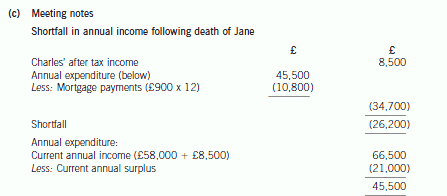
When considering the shortfall
– The family’s expenditure is likely to increase as the children get older, particularly if there is a need for school fees.
– There will be a need for some cash immediately to pay for the cost of the funeral.
– It is assumed that the whole of Jane’s estate has been left to Charles such that there will be no inheritance tax on her
death.
– The shortfall may be reduced by:
(i) State benefits and tax credits.
(ii) Expenditure on non-essential items, e.g. holidays and entertainment included in the annual expenditure of
£45,500.
(iii) The income generated by Charles if he were to return to work.
– The shortfall may be increased by additional child-care costs due to Charles being a single parent, particularly if he
returns to work full-time.
Further information required
– The level of state benefits and tax credits available to Charles.
– The current level of expenditure on non-essential items.
– The costs of child-care if Charles were to return to work.
– Details of any wills made by Charles or Jane.
– Whether Charles’ investment properties could be sold and the proceeds invested in assets with a higher annual return.
– Whether there is any value in Speak Write Ltd independent of Jane, such that the company could be sold after Jane’s
death.
Other related issues
– The couple should consider making provision for their retirement via pension contributions or some other form. of long
term investment plan.
– The couple should recognise that there would be significant financial problems if Jane were to become seriously ill. In
addition to the family’s income falling as set out above, its expenditure would probably increase.
Protection products
– Term life assurance
A qualifying life policy would pay out a tax-free lump sum on Jane’s death.
– Permanent health insurance
Would provide a regular income if Jane were unable to work due to illness.
– Critical illness insurance
Would provide a capital sum in the event of Jane being diagnosed with an insured illness. -
第7题:
(c) Explain the capital gains tax (CGT) and income tax (IT) issues Paul and Sharon should consider in deciding
which form. of trust to set up for Gisella and Gavin. You are not required to consider inheritance tax (IHT) or
stamp duty land tax (SDLT) issues. (10 marks)
You should assume that the tax rates and allowances for the tax year 2005/06 apply throughout this question.
正确答案:
(c) As the trust is created in the settlors’ (Paul and Sharon’s) lifetime its creation will constitute a chargeable disposal for capital
gains tax. Also, as the settlors and trustees are connected persons, the disposal will be deemed to be at market value, resulting
in a chargeable gain of £80,000 (160,000 – 80,000). No taper relief will be available as the property is a non-business
asset, and has been held for less than three years, but annual exemptions of £17,000 (2 x £8,500) will be available.
However, in the case of a discretionary trust, gift hold over relief will be available. This is because the gift will constitute a
chargeable lifetime transfer and because there is an immediate charge to inheritance tax (even though no tax is payable due
to the nil rate band) relief is available if a specific accumulation and maintenance trust is used, as in this case the gift will
qualify as a potentially exempt transfer and so gift relief would only be available in respect of business assets. The use of a
basic discretionary trust will thus facilitate the deferral of an immediate capital gains tax charge of £25,200 (63,000 x 40%).
If/when the property is disposed of, however, the trustees will pay capital gains tax on the deferred gain at the trust income
tax rate of 40%, and have an annual exemption of only £4,250 (50% of the normal individual rate) available to them. The
40% rate of tax and lower annual exemption rate also apply to chargeable gains arising in a specific accumulation and
maintenance trust, as well as a basic discretionary trust.
A chargeable disposal between connected persons will also arise for the purposes of capital gains tax if/when the property
vests in a beneficiary, i.e. one or more of the beneficiaries becomes absolutely entitled to all or part of the income or capital
of the trust. Gift hold over relief will again be available on all assets in the case of a discretionary trust, but only on business
assets in the case of an accumulation and maintenance trust, except where a beneficiary becomes entitled to both income
and capital at the same time.
The trust will have taxable property income in the form. of net rents from its creation and in future years is also likely to have
other investment income, probably in the form. of interest, to the extent that monies are retained in the trust. Whichever form
of trust is used, the trustees will pay tax at the standard trust rate of 40% on income other than dividend income (32·5%),
except to the extent of (1) the first £500 of taxable income, which is taxed at the rate that would otherwise apply to such
income (i.e. 22% for non-savings (rental) income, 20% for savings income (interest) and 10% for dividends) but, only to the
extent that it is not distributed; and (2) the legitimate trust management expenses, which are offsettable for the purposes of
the higher trust tax rates against the income with the lowest rate(s) of normal tax and so bear tax only at that rate. The higher
trust tax rate always applies to income that is distributed, other than to the extent that it has been treated as the settlor’s
income, and taxed at that settlor’s marginal tax rate.
As Paul and Sharon intend to create a trust for their unmarried minor (under 18) children, then even if the trust specifically
excludes them from any benefit under the trust, the trust income will be treated as theirs for income tax purposes to the extent
that it constitutes income paid for on behalf (including maintenance payments) of Gisella and Gavin; except where (1) the
total income arising does not exceed £100 gross per annum, and (2) income is held for the benefit of a child under an
accumulation and maintenance settlement, to the extent that it is not paid out. -
第8题:
4 (a) For this part, assume today’s date is 1 March 2006.
Bill and Ben each own 50% of the ordinary share capital in Flower Limited, an unquoted UK trading company
that makes electronic toys. Flower Limited was incorporated on 1 August 2005 with 1,000 £1 ordinary shares,
and commenced trading on the same day. The business has been successful, and the company has accumulated
a large cash balance of £180,000, which is to be used to purchase a new factory. However, Bill and Ben have
received an offer from a rival company, which they are considering. The offer provides Bill and Ben with two
alternative methods of payment for the purchase of their shares:
(i) £480,000 for the company, inclusive of the £180,000 cash balance.
(ii) £300,000 for the company assuming the cash available for the factory purchase is extracted prior to sale.
Bill and Ben each currently receive a gross salary of £3,750 per month from Flower Limited. Part of the offer
terms is that Bill and Ben would be retained as employees of the company on the same salary.
Neither Bill nor Ben has used any of their capital gains tax annual exemption for the tax year 2005/06.
Required:
(i) Calculate which of the following means of extracting the £180,000 from Flower Limited on 31 March
2006 will result in the highest after tax cash amount for Bill and Ben:
(1) payment of a dividend, or
(2) payment of a salary bonus.
You are not required to consider the corporation tax (CT) implications for Flower Limited in your
answer. (5 marks)
正确答案: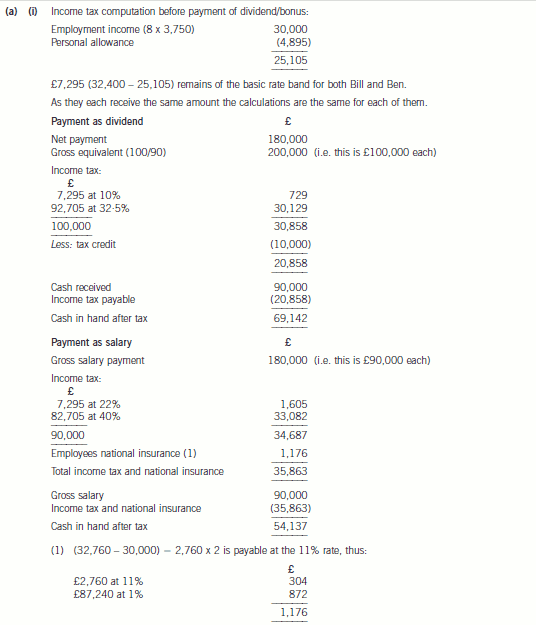
As a result, Bill and Ben would each be better off by £15,005 (69,142 – 54,137). If the cash were extracted by way
of dividend.
Tutorial note: In this answer the employers’ national insurance liability on the salary has been ignored. Credit would be
given to a candidate who recognised this issue. -
第9题:
(b) Advise on the capital gains implications should Trent Limited’s old building be sold as proposed. Support your
advice with relevant calculations. (4 marks)
正确答案:
This gives a higher post-entry loss of £50,000 (150,000 – 100,000) and so it is advisable for Trent Limited to make
this election.
The £100,000 of pre-entry losses are still available, but can only be set against gains on assets which:
(i) Trent Limited sold prior to being acquired (subject to the normal carry back restrictions), or
(ii) Trent Limited already owned when it was acquired, or
(iii) Trent Limited acquired from outside the group and used in its trade after being bought by Tay Limited. -
第10题:
(b) Calculate Alvaro Pelorus’s capital gains tax liability for the tax year 2006/07 on the assumption that all
available reliefs are claimed. (8 marks)
正确答案: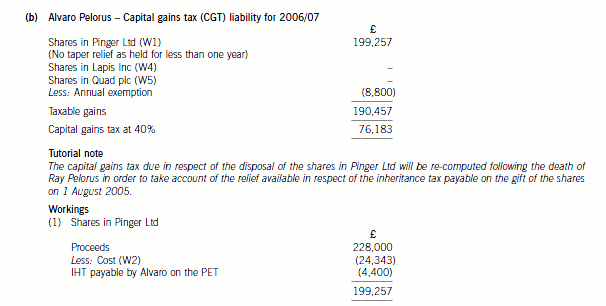

-
第11题:
4 Coral is the owner and managing director of Reef Ltd. She is considering the manner in which she will make her first
pension contributions. In November 2007 she inherited her mother’s house in the country of Kalania.
The following information has been extracted from client files and from telephone conversations with Coral.
Coral:
– 1972 – Born in the country of Kalania. Her father, who died in 2002, was domiciled in Kalania.
– 1999 – Moved to the UK and has lived and worked here since then.
– 2001 – Subscribed for 100% of the ordinary share capital of Reef Ltd.
– Intends to sell Reef Ltd and return to live in the country of Kalania in 2012.
– No income apart from that received from Reef Ltd.
Reef Ltd:
– A UK resident company with annual profits chargeable to corporation tax of approximately £70,000.
– Four employees including Coral.
– Provides scuba diving lessons to members of the public.
Payments from Reef Ltd to Coral in 2007/08:
– Director’s fees of £460 per month.
– Dividends paid of £14,250 in June 2007 and £14,250 in September 2007.
Pension contributions:
– Coral has not so far made any pension contributions in the tax year 2007/08 but wishes to make gross pension
contributions of £9,000.
– The contributions are to be made by Reef Ltd or Coral or a combination of the two in such a way as to minimise
the total after tax cost.
– Any contributions made by Coral will be funded by an additional dividend from Reef Ltd.
House in the country of Kalania:
– Beachfront property with potential rental income of £550 per month after deduction of allowable expenditure.
– Coral will use it for holidays for two months each year.
The tax system in the country of Kalania:
– No capital gains tax or inheritance tax.
– Income tax at 8% on income arising in the country of Kalania.
– No double tax treaty with the UK.
Required:
(a) With the objective of minimising the total after tax cost, advise Coral as to whether the gross pension
contributions of £9,000 should be made:
– wholly by Reef Ltd; or
– by Coral to the extent that they are tax allowable with the balance made by Reef Ltd.
Your answer should include supporting calculations where necessary. (9 marks)
正确答案:
-
第12题:
(c) (i) Calculate Benny’s capital gains tax liability for 2006/07. (6 marks)
正确答案:
-
第13题:
(c) (i) Explain the capital gains tax (CGT) implications of a takeover where the consideration is in the form. of
shares (a ‘paper for paper’ transaction) stating any conditions that need to be satisfied. (4 marks)
正确答案:
(c) (i) Paper for paper rules
The proposed transaction broadly falls under the ‘paper for paper’ rules. Where this is the case, chargeable gains do not
arise. Instead, the new holding stands in the shoes (and inherits the base cost) of the original holding.
The company issuing the new shares must:
(i) end up with more than 25% of the ordinary share capital (or a majority of the voting power) of the old company,
OR
(ii) make a general offer to shareholders in the other company with a condition that, if satisfied, would give the
acquiring company control of the other company.
The exchange must be for bona fide commercial reasons and must not have as its main purpose (or one of its main
purposes) the avoidance of CGT or corporation tax. The acquiring company can obtain advance clearance from the
Inland Revenue that the conditions will be met.
If part of the offer consideration is in the form. of cash, a gain must be calculated using the part disposal rules. If the
cash received is not more than the higher of £3,000 or 5% of the total value on takeover, then the amount received in
cash can be deducted from the base cost of the securities under the small distribution rules. -
第14题:
(c) Advise Alan on the proposed disposal of the shares in Mobile Ltd. Your answer should include calculations
of the potential capital gain, and explain any options available to Alan to reduce this tax liability. (7 marks)
正确答案: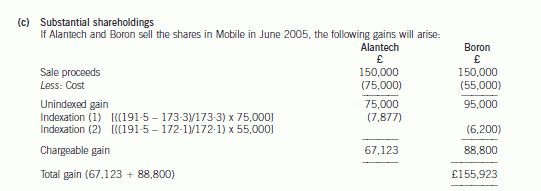
However, an exemption from corporation tax exists for any gain arising when a trading company (or member of a trading
group) sells the whole or any part of a substantial shareholding in another trading company.
A substantial shareholding is one where the investing company holds 10% of the ordinary share capital and is beneficially
entitled to at least 10% of the
(i) profits available for distribution to equity holders and
(ii) assets of the company available for distribution to equity holders on a winding up.
In meeting the 10% test, shares owned by a chargeable gains group may be amalgamated. The 10% test must have been
met for a continuous 12 month period during the 2 years preceding the disposal.
The companies making the disposals must have been trading companies (or members of a trading group) throughout the
12 month period, as well as at the date of disposal. In addition, they must also be trading companies (or members of a trading
group) immediately after the disposal.
The exemption is given automatically, and acts to deny losses as well as eliminate gains.
While Alantech Ltd has owned its holding in Mobile Ltd for 33 months, its ownership of the Boron holding has only lasted
for 10 months (at 1 June 2005) since Boron was acquired on 1 July 2004. Selling the shares in June 2005 will fail the
12 month test, and the gain will become chargeable.
It would be better for the companies to wait for a further month until July 2005 before selling the amalgamated shareholding.
By doing so, they will both be able to take advantage of the substantial shareholdings relief, thereby saving tax of £29,625
assuming a corporation tax rate of 19%. -
第15题:
3 On 1 January 2007 Dovedale Ltd, a company with no subsidiaries, intends to purchase 65% of the ordinary share
capital of Hira Ltd from Belgrove Ltd. Belgrove Ltd currently owns 100% of the share capital of Hira Ltd and has no
other subsidiaries. All three companies have their head offices in the UK and are UK resident.
Hira Ltd had trading losses brought forward, as at 1 April 2006, of £18,600 and no income or gains against which
to offset losses in the year ended 31 March 2006. In the year ending 31 March 2007 the company expects to make
further tax adjusted trading losses of £55,000 before deduction of capital allowances, and to have no other income
or gains. The tax written down value of Hira Ltd’s plant and machinery as at 31 March 2006 was £96,000 and
there will be no fixed asset additions or disposals in the year ending 31 March 2007. In the year ending 31 March
2008 a small tax adjusted trading loss is anticipated. Hira Ltd will surrender the maximum possible trading losses
to Belgrove Ltd and Dovedale Ltd.
The tax adjusted trading profit of Dovedale Ltd for the year ending 31 March 2007 is expected to be £875,000 and
to continue at this level in the future. The profits chargeable to corporation tax of Belgrove Ltd are expected to be
£38,000 for the year ending 31 March 2007 and to increase in the future.
On 1 February 2007 Dovedale Ltd will sell a small office building to Hira Ltd for its market value of £234,000.
Dovedale Ltd purchased the building in March 2005 for £210,000. In October 2004 Dovedale Ltd sold a factory
for £277,450 making a capital gain of £84,217. A claim was made to roll over the gain on the sale of the factory
against the acquisition cost of the office building.
On 1 April 2007 Dovedale Ltd intends to acquire the whole of the ordinary share capital of Atapo Inc, an unquoted
company resident in the country of Morovia. Atapo Inc sells components to Dovedale Ltd as well as to other
companies in Morovia and around the world.
It is estimated that Atapo Inc will make a profit before tax of £160,000 in the year ending 31 March 2008 and will
pay a dividend to Dovedale Ltd of £105,000. It can be assumed that Atapo Inc’s taxable profits are equal to its profit
before tax. The rate of corporation tax in Morovia is 9%. There is a withholding tax of 3% on dividends paid to
non-Morovian resident shareholders. There is no double tax agreement between the UK and Morovia.
Required:
(a) Advise Belgrove Ltd of any capital gains that may arise as a result of the sale of the shares in Hira Ltd. You
are not required to calculate any capital gains in this part of the question. (4 marks)
正确答案:
(a) Capital gains that may arise on the sale by Belgrove Ltd of shares in Hira Ltd
Belgrove Ltd will realise a capital gain on the sale of the shares unless the substantial shareholding exemption applies. The
exemption will be given automatically provided all of the following conditions are satisfied.
– Belgrove Ltd has owned at least 10% of Hira Ltd for a minimum of 12 months during the two years prior to the sale.
– Belgrove Ltd is a trading company or a member of a trading group during that 12-month period and immediately after
the sale.
– Hira Ltd is a trading company or the holding company of a trading group during that 12-month period and immediately
after the sale.
Hira Ltd will no longer be in a capital gains group with Belgrove Ltd after the sale. Accordingly, a capital gain, known as a
degrouping charge, may arise in Hira Ltd. A degrouping charge will arise if, at the time it leaves the Belgrove Ltd group, Hira
Ltd owns any capital assets which were transferred to it at no gain, no loss within the previous six years by a member of the
Belgrove Ltd capital gains group. -
第16题:
(c) Outline the ways in which Arthur and Cindy can reduce their income tax liability by investing in unquoted
shares and recommend, with reasons, which form. of investment best suits their circumstances. You are not
required to discuss the qualifying conditions applicable to the investment vehicle recommended. (5 marks)
You should assume that the income tax rates and allowances for the tax year 2005/06 apply throughout this
question
正确答案:
(c) Reduction of income tax liability by investing in unquoted shares
The two forms of investment
Income tax relief is available for investments in venture capital trusts (VCTs) and enterprise investment scheme (EIS) shares.
A VCT is a quoted company that invests in shares in a number of unquoted trading companies. EIS shares are shares in
qualifying unquoted trading companies.
Recommendation
The most suitable investment for Arthur and Cindy is a VCT for the following reasons.
– An investment in a VCT is likely to be less risky than investing directly in EIS companies as the risk will be spread over
a greater number of companies.
– The tax deduction is 40% of the amount invested as opposed to 20% for EIS shares.
– Dividends from a VCT are not taxable whereas dividends on EIS shares are taxed in the normal way. -
第17题:
(d) Explain how Gloria would be taxed in the UK on the dividends paid by Bubble Inc and the capital gains tax
and inheritance tax implications of a future disposal of the shares. Clearly state, giving reasons, whether or
not the payment made to Eric is allowable for capital gains tax purposes. (9 marks)
You should assume that the rates and allowances for the tax year 2005/06 apply throughout this question.
正确答案:
(d) UK tax implications of shares in Bubble Inc
Income tax
Gloria is UK resident and is therefore subject to income tax on her worldwide income. However, because she is non-UK
domiciled, she will only be taxed on the foreign dividends she brings into the UK.
Dividends brought into the UK will be grossed up for any tax paid in Oceania. The gross amount is taxed at 10% if it falls
into the starting or basic rate band and at 321/2% if it falls into the higher rate band. The tax suffered in Oceania is available
for offset against the UK tax liability. The offset is restricted to a maximum of the UK tax on the dividend income.
Capital gains tax
Individuals are subject to capital gains tax on worldwide assets if they are resident or ordinarily resident in the UK. However,
because Gloria is non-UK domiciled and the shares are situated abroad, the gain is only taxable to the extent that the sales
proceeds are brought into the UK. Any tax suffered in Oceania in respect of the gain is available for offset against the UK
capital gains tax liability arising on the shares.
Any loss arising on the disposal of the shares would not be available for relief in the UK.
In computing a capital gain or allowable loss, a deduction is available for the incidental costs of acquisition. However, to be
allowable, such costs must be incurred wholly and exclusively for the purposes of acquiring the asset. The fee paid to Eric
related to general investment advice and not to the acquisition of the shares and therefore, would not be deductible in
computing the gain.
Taper relief will be at non-business asset rates as Bubble Inc is an investment company.
Inheritance tax
Assets situated abroad owned by non-UK domiciled individuals are excluded property for the purposes of inheritance tax.
However, Gloria will be deemed to be UK domiciled (for the purposes of inheritance tax only) if she has been resident in the
UK for 17 out of the 20 tax years ending with the year in which the disposal occurs.
Gloria has been running a business in the UK since June 1992 and would therefore, appear to have been resident for at least
15 tax years (1992/93 to 2006/07 inclusive).
If Gloria is deemed to be UK domiciled such that the shares in Bubble Inc are not excluded property, business property relief
will not be available because Bubble Inc is an investment company. -
第18题:
(ii) Assuming the relief in (i) is available, advise Sharon on the maximum amount of cash she could receive
on incorporation, without triggering a capital gains tax (CGT) liability. (3 marks)
正确答案:
(ii) As Sharon is entitled to the full rate of business asset taper relief, any gain will be reduced by 75%. The position is
maximised where the chargeable gain equals Sharon’s unused capital gains tax annual exemption of £8,500. Thus,
before taper relief, the gain she requires is £34,000 (1/0·25 x £8,500).
The amount to be held over is therefore £46,000 (80,000 – 34,000). Where part of the consideration is in the form
of cash, the gain eligible for incorporation relief is calculated using the formula:
Gain deferred = Gain x value of shares issued/total consideration
The formula is manipulated on the following basis:
£46,000 = £80,000 x (shares/120,000)
Shares/120,000 = £46,000/80,000
Shares = £46,000 x 120,000/80,000
i.e. £69,000.
As the total consideration is £120,000, this means that Sharon can take £51,000 (£120,000 – £69,000) in cash
without any CGT consequences. -
第19题:
(c) For commercial reasons, Damian believes that it would be sensible to place a new holding company, Bold plc,
over the existing company, Linden Limited. Bold plc would also be unquoted and would acquire the existing
Linden Limited shares in exchange for the issue of its own shares.
If the new structure is implemented, Bold plc will provide management services to Linden Limited, but the
amount that will be charged for these services is yet to be determined.
Required:
(i) State the capital gains tax (CGT) issues that Damian should be aware of before disposing of his shares
in Linden Limited to Bold plc. Your answer should include details of any conditions that will need to be
satisfied if an immediate charge to tax is to be avoided. (4 marks)
正确答案:
(c) (i) The proposed transaction broadly falls under the ‘paper for paper’ rules. Where this is the case, chargeable gains do not
arise. Instead, the new holding stands in the shoes (and inherits the base cost) of the original holding.
The company issuing the new shares must:
(i) end up with more than 25% of the ordinary share capital or a majority of the voting power of the old company,
OR
(ii) make a general offer to shareholders in the old company with a condition which would give the acquiring company
control of the company if accepted.
The exchange must be for bona fide commercial reasons and not have as its main purpose (or one of its main purposes)
the avoidance of capital gains tax or corporation tax.
The issue of shares by Bold plc satisfies these conditions, thus Damian, as a shareholder of Linden Limited, will not be
taxed on the exchange of shares. -
第20题:
(b) For this part, assume today’s date is 1 May 2010.
Bill and Ben decided not to sell their company, and instead expanded the business themselves. Ben, however,
is now pursuing other interests, and is no longer involved with the day to day activities of Flower Limited. Bill
believes that the company would be better off without Ben as a voting shareholder, and wishes to buy Ben’s
shares. However, Bill does not have sufficient funds to buy the shares himself, and so is wondering if the
company could acquire the shares instead.
The proposed price for Ben’s shares would be £500,000. Both Bill and Ben pay income tax at the higher rate.
Required:
Write a letter to Ben:
(1) stating the income tax (IT) and/or capital gains tax (CGT) implications for Ben if Flower Limited were to
repurchase his 50% holding of ordinary shares, immediately in May 2010; and
(2) advising him of any available planning options that might improve this tax position. Clearly explain any
conditions which must be satisfied and quantify the tax savings which may result.
(13 marks)
Assume that the corporation tax rates for the financial year 2005 and the income tax rates and allowances
for the tax year 2005/06 apply throughout this question.
正确答案:(b) [Ben’s address] [Firm’s address]
Dear Ben [Date]
A company purchase of own shares can be subject to capital gains treatment if certain conditions are satisfied. However, one
of these conditions is that the shares in question must have been held for a minimum period of five years. As at 1 May 2010,
your shares in Flower Limited have only been held for four years and ten months. As a result, the capital gains treatment will
not apply.
In the absence of capital gains treatment, the position on a company repurchase of its own shares is that the payment will
be treated as an income distribution (i.e. a dividend) in the hands of the recipient. The distribution element is calculated as
the proceeds received for the shares less the price paid for them. On the basis that the purchase price is £500,000, then the
element of distribution will be £499,500 (500,000 – 500). This would be taxed as follows: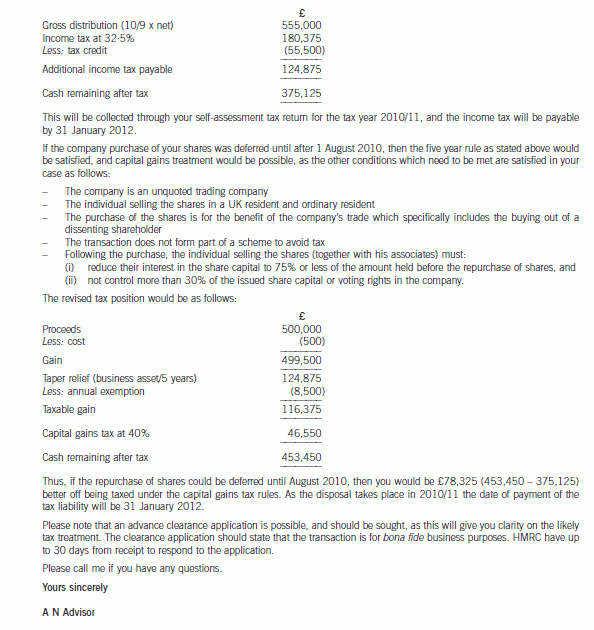
-
第21题:
(ii) Advise Andrew of the tax implications arising from the disposal of the 7% Government Stock, clearly
identifying the tax year in which any liability will arise and how it will be paid. (3 marks)
正确答案:
(ii) Government stock is an exempt asset for the purposes of capital gains tax, however, as Andrew’s holding has a nominal
value in excess of £5,000, a charge to income tax will arise under the accrued income scheme. This charge to income
tax will arise in 2005/06, being the tax year in which the next interest payment following disposal falls due (20 April
2005) and it will relate to the income accrued for the period 21 October 2004 to 14 March 2005 of £279 (145/182
x £350). As interest on Government Stock is paid gross (unless the holder applies to receive it net), the tax due of £112
(£279 x 40%) will be collected via the self-assessment system and as the interest was an ongoing source of income
will be included within Andrew’s half yearly payments on account payable on 31 January and 31 July 2006. -
第22题:
(ii) Advise Clifford of the capital gains tax implications of the alternative of selling the Oxford house and
garden by means of two separate disposals as proposed. Calculations are not required for this part of
the question. (3 marks)
正确答案:
(ii) The implications of selling the Oxford house and garden in two separate disposals
The additional sales proceeds would result in an increase in Clifford’s capital gains and consequently his tax liability.
When computing the gain on the sale of the house together with a small part of the garden, the allowable cost would
be a proportion of the original cost. That proportion would be A/A + B where A is the value of the house and garden
that has been sold and B is the value of the part of the garden that has been retained. Principal private residence relief
and taper relief would be available in the same way as that set out in (i) above.
When computing the gain on the sale of the remainder of the garden, the cost would be the original cost of the property
less the amount used in computing the gain on the earlier disposal. Principal private residence relief would not be
available as the land sold is not a dwelling house or part of one. -
第23题:
(b) Prepare a reasoned explanation of how any capital gains tax arising in the UK on the sale of the paintings
can be minimised. (2 marks)
正确答案:
(b) Minimising capital gains tax on the sale of the paintings
Galileo will become resident and ordinarily resident from the date he arrives in the UK as he intends to stay for more than
three years. Prior to that date he will be neither resident nor ordinarily resident such that he will not be subject to UK capital
gains tax.
Galileo should sell the paintings before he leaves Astronomeria; this will avoid UK capital gains tax completely.
Tutorial note
The gains would be taxable on the remittance basis if the paintings were sold after Galileo’s arrival in the UK. However, this
would not help Galileo to minimise the capital gains tax due as he needs to bring the sales proceeds into the UK in order
to purchase a house.
